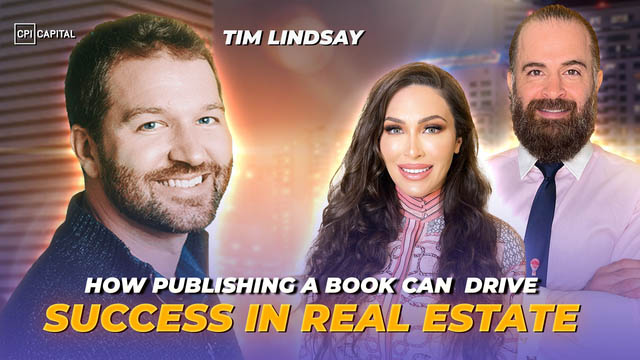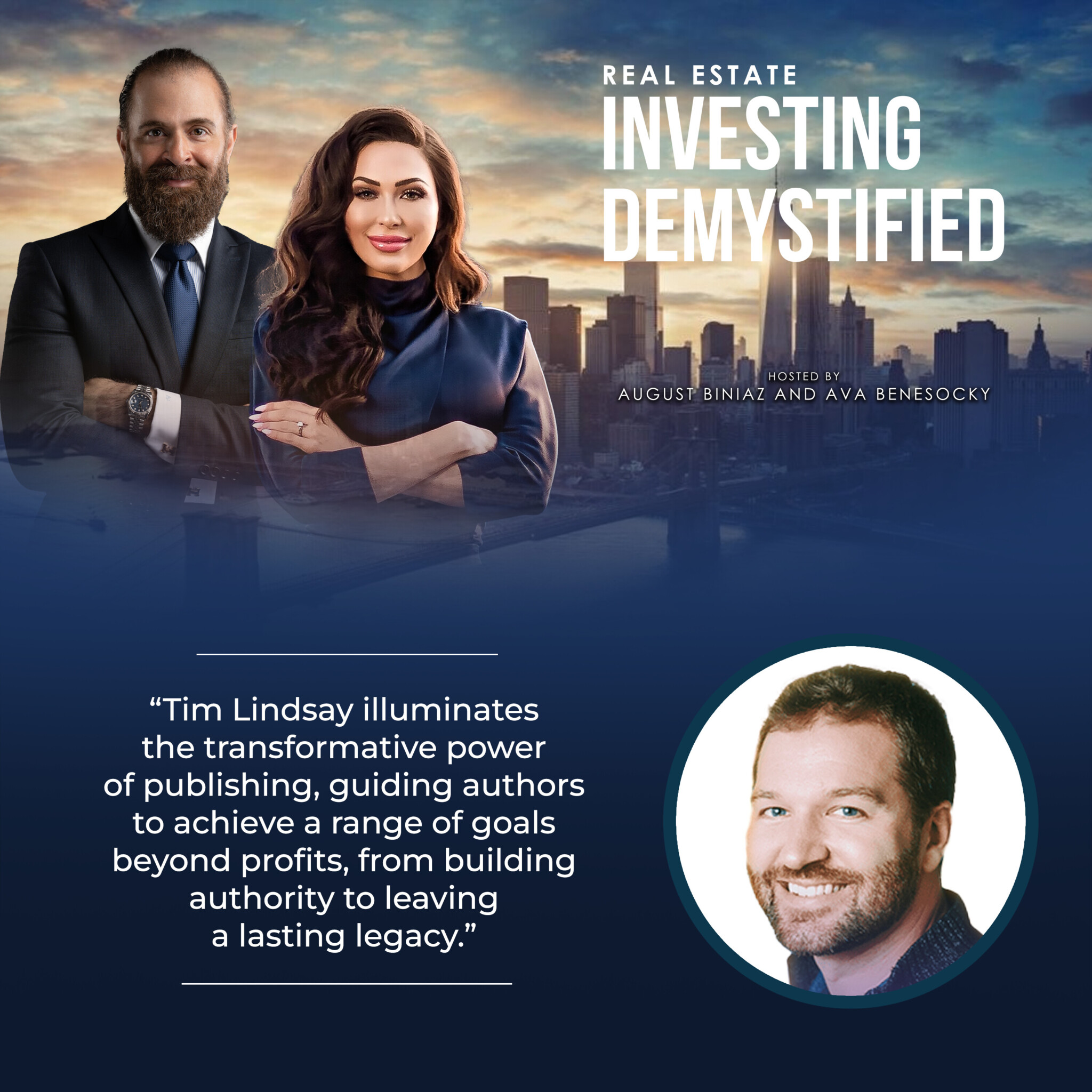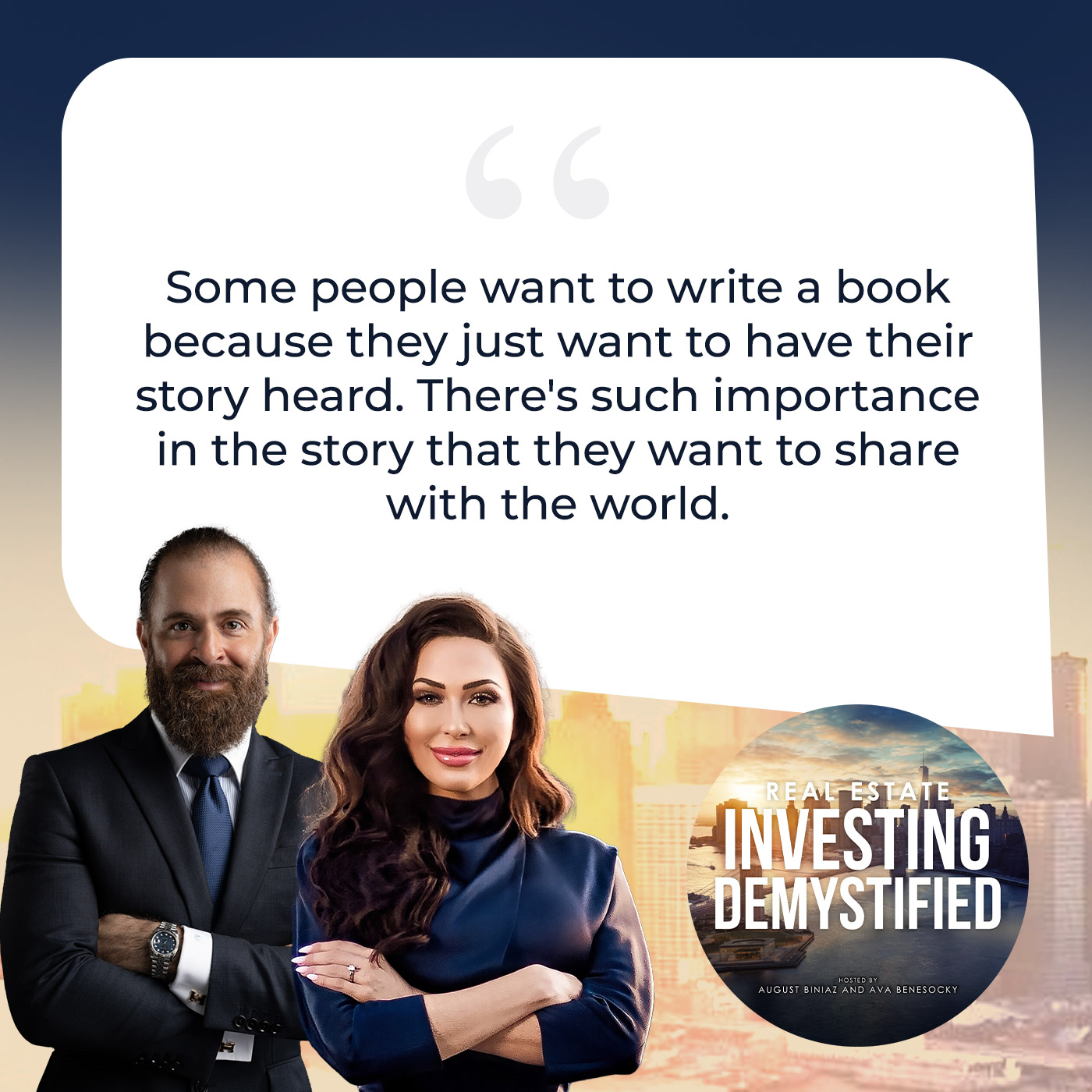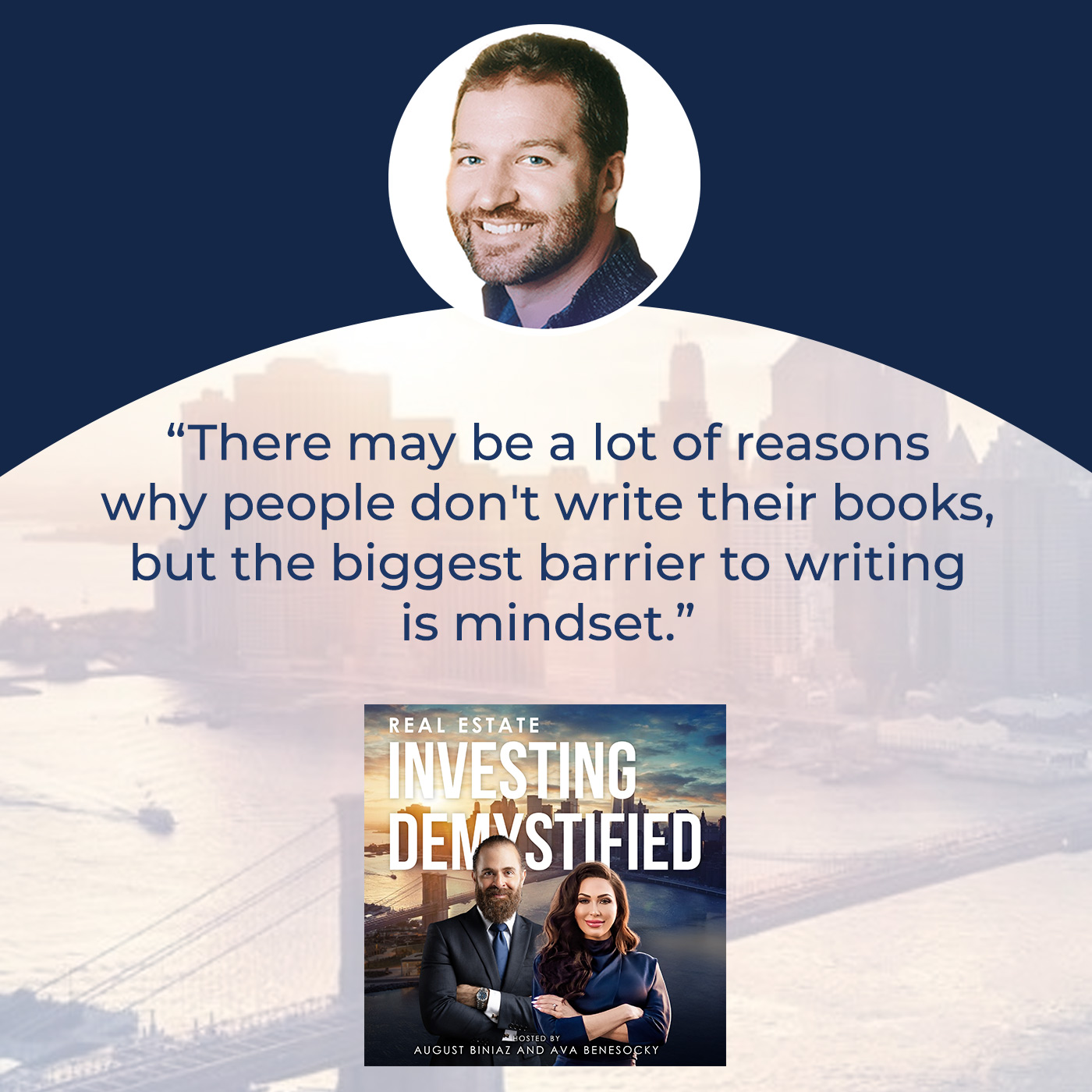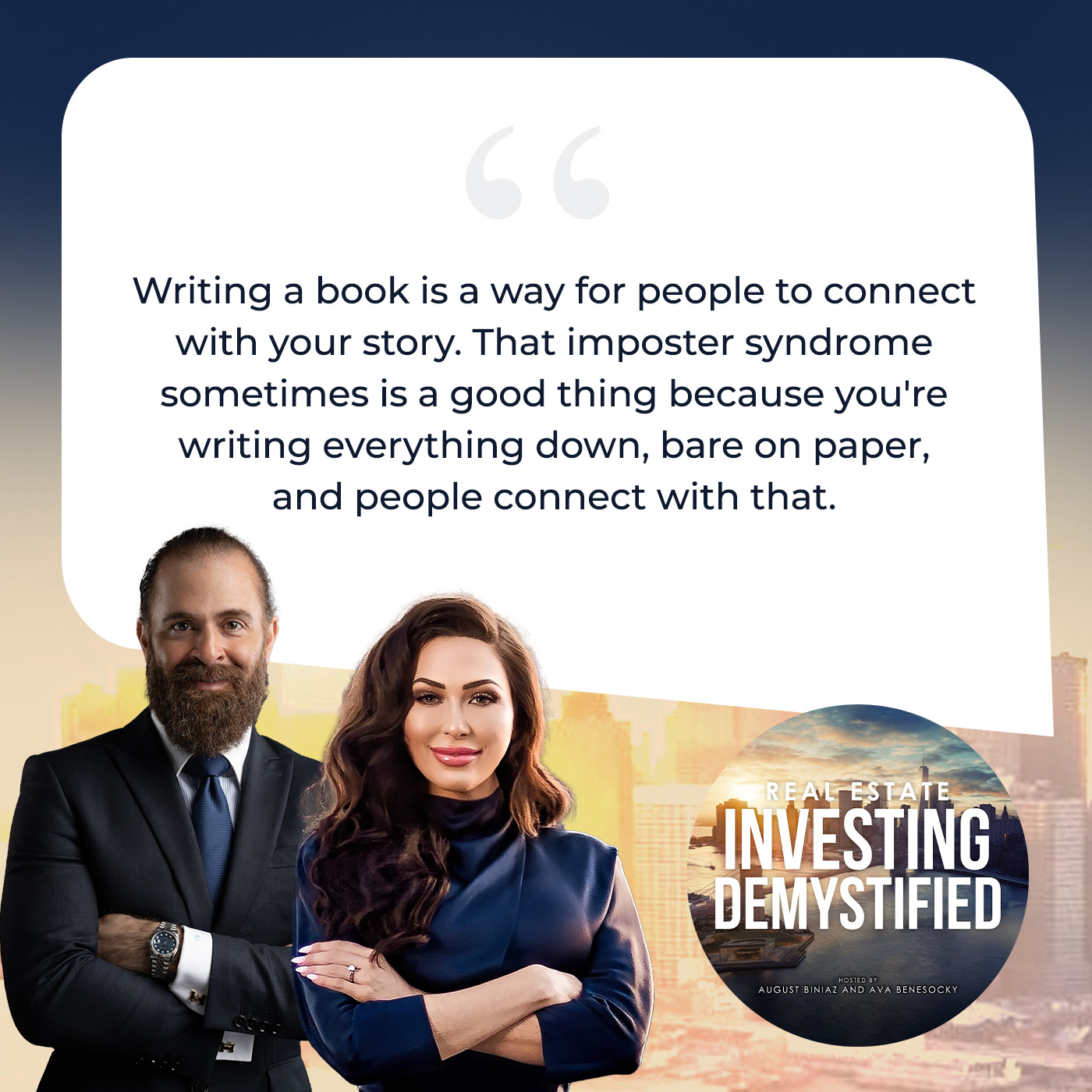Discover how publishing a book can be a secret weapon for real estate professionals. Join Ava Benesocky and August Biniaz as they sit down with Tim Lindsay, founder of Tellwell, to explore the transformative power of publishing. Tim shares his fascinating journey into the industry, highlighting the rise of self-publishing and how it empowers authors to achieve a range of goals beyond just profits. He breaks down the motivations behind writing a book, from building authority and generating leads to leaving a lasting legacy. Tune in to learn how to leverage the power of publishing to elevate your real estate career.
Get in touch with Tim LIndsay:
If you are interested in learning more about passively investing in multifamily and build-to-rent properties, click here to schedule a call with the CPI Capital Team or contact us at info@cpicapital.ca. If you like to co-syndicate and close on larger deals as a general partner, click here. You can read more about CPI Capital at https://www.cpicapital.ca/.
#avabenesocky #augustbiniaz #cpicapital
—
Watch the episode here
Listen to the podcast here
Important Links
- TellWell Publishing
- TellWell Publishing on Instagram
- Tim Lindsay’s LinkedIn profile
- 1984
- Animal Farm
- Think and Grow Rich
- The Anxious Generation: How the Great Rewiring of Childhood Is Causing an Epidemic of Mental Illness
- The Coddling of the American Mind: How Good Intentions and Bad Ideas Are Setting Up a Generation for Failure
About Tim Linday
Tim Lindsay is the founder of Tellwell, a publishing company he launched in 2015. Since then, he and his team have helped guide some 5,000 authors—including real estate professionals, entrepreneurs, speakers, coaches, consultants, and community builders—through the process of writing and publishing their books. Tim specializes in helping experts share their knowledge, grow their personal brand, and establish authority through books. His company works with clients from all walks of life, including athletes, nonprofit leaders, and influencers, giving them the tools they need to publish impactful nonfiction books.
How Publishing A Book Can Drive Success In Real Estate – Tim Lindsay
Welcome to the Real Estate Investing Demystified show. We’re joined by Tim Lindsay. Tim Lindsay is the founder of Tellwell, a publishing company he launched in 2015. Since then, he and his team have helped guide some 5,000 authors, including real estate professionals, entrepreneurs, speakers, coaches, consultants, and community builders, through the process of writing and publishing their books. Tim specializes in helping experts share their knowledge, grow their personal brand, and establish authority through books. His company works with clients from all walks of life, including athletes, nonprofit leaders, and influencers, giving them the tools they need to publish impactful nonfiction books. Welcome to the show, Tim. We’re happy to have you here.
Welcome, Tim.
Thanks for having me.
Getting Into The Book Publishing Industry
Thanks for being here. Tim, why don’t you start off by telling us, how did you get into the book publishing business? Where did you start off? Were you an English major? Let us know.
Yeah, maybe I did start off as an English major and trying to go into writing at school, but very quickly, in first year post-secondary, I dropped out of writing because I realized, why would I be writing in the first place? I was influenced by George Orwell, who wrote 1984 and Animal Farm. His writing was for a purpose, it was to try to stop totalitarianism, as was in Stalinist Russia. He had a very strong purpose, but what was my purpose as an eighteen-year-old? I dropped out because I realized I didn’t know why I would be writing.
Several years later, I ended up managing the campus newspaper for two years. That threw me back into publishing. It was really interesting. It was the first time the campus newspaper had a more conservative editor, which is rare on campuses, as you may know, but that made it a really nice dynamic environment. Two years printing 8,000 copies of a tabloid newspaper every week, and loved it. Loved it a lot, learned a lot. Most of our revenue came from advertising, so I started to learn about business then.
After that, it was 2009, and that’s when the real estate, banking, recessionary economy was hitting, and I just couldn’t find a job at that point. All the newspapers were downsizing, publishing companies were often downsizing, a lot of shift in revenue to online advertising, and so on. I had a go at self-employment for about a year, trying to work with startup publications and so on, but ultimately failed. I took a full-time job as an employee for three years working in a publishing company, working with authors, representing a team of editors and designers, and talking to authors about the publishing process.
Eventually, though, I left that job and took a job in mobile media marketing. My wife, you both met her before, she was into real estate investment, and before she was into publishing and real estate investment, she was a TV journalist, and she would do video TV journalism every day. But she took a job for a year doing the evening news. I had my evenings free, and I really missed working with authors and talking to them about publishing.
I actually wrote a book trying to share my expertise with editors, designers, and marketers about how they could work with authors and how they could sell themselves and collaborate. Ultimately, that book, I wrote it really quickly, led me into starting a little side hustle, working with authors and helping them self-publish. That led me to talk to my employer, say, this is what I’m doing. Ultimately, I quit my job within a couple of months, and I had my broken iPhone 4 and some great relationships with authors and built it from there.
We’re almost nine years in, so we work with thousands of authors, and it’s turned into this business. We’ve got a great team and lots of ups and downs and sideways. I love talking to entrepreneurs, people taking risks. I love talking about publishing and authors. Hit me with any questions you have, I’m happy to get into it.
Crash Course On Book Publishing Basics
Amazing, thank you for the background. We’re looking to give our audience a crash course about how book publishing works. Could we go to the basics and understand, what is an editor, what is a publisher, how to differentiate, and do authors really need to have both editors and publishers? Give us a quick rundown of that part.
Yeah, sure. There’s what’s called self-publishing, and there’s what’s called traditional publishing, and there’s variations across those, and we can get into that. The basics of self-publishing is that the author has more control, and the author is basically owning the project, and if they’re going to be investing in things like editing and design, they’re owning that investment. They’re retaining control of the timeline, of the rights to their book, how they use it. On the other hand, the traditional side is where you’re trying to basically get a publisher, like an investor, to see a business case to invest in your book based on their criteria. That can make sense sometimes, but for many entrepreneurs, they just don’t want to try to fit that box for what a publisher would be looking for, and so they will go through some form of self-publishing.
Even on the self-publishing side, you can go radically do it yourself, but the downside of that is your quality might suffer, you might not know what you’re doing, you might get confused, and then you can go where you are hiring some freelancers, or you can go where you’re working with a company like ours who does some guidance, some project management, and helping you through those processes. You don’t need to work with a publishing company per se, you could do it more yourself.
As far as editing, you probably should work with an editor. It’s possible that you don’t have to, but it’s highly recommended, even if you’re going through some form of self-publishing. It’s definitely recommended that you do work with an editor. They can help you, they don’t take away your voice, they can help your voice, keep your voice, and just help your editorial be a lot better.
Editors don't take away your voice. They help keep your voice. Share on XThe big change that happened in the industry, and why the whole, that turned it, that really resulted in the rise of self-publishing is the changes in distribution. Because what is publishing? It’s you have to write a book, but then it’s basically editing, design, distribution, and then marketing and promoting the book. It’s that distribution where that would confuse most people. That’s where the whole industry transformed because of ebooks, because of print on demand, and because of e-commerce, Amazon.
In the old days, you had to print thousands of copies in order to publish. You had to try to get an agent and try to get a publisher, and the publisher had to try to get distribution into physical bookstores. You had to go through all those gatekeepers to publish, and there was a fair bit of risk involved. That all got basically turned on its head with the advent of print on demand, of ebooks, and of e-commerce, because it meant that even somebody self-publishing could have access to the sales channels, right alongside traditionally published books.
It leaves open that question, are they going to be quality books? That depends. In the old days, it was an agent and a publisher who’d decide what is published. Nowadays, there’s still one big gatekeeper, and that’s the reader. You can get your book on Amazon, you can have access to the distribution channels, that’s all available to anyone. Still, a lot of people would like some guidance on it, they might want some support, and many people will want quality because they care about their reputation and so on. That quality often comes with help from people like editors and professional designers, and so on.
Got it. Taking a quick step back, are you guys a publisher? How would you define yourself?
A publishing house?
I would define, publishing house, usually that term refers to the traditional side of the industry. We provide professional publishing services. I would say, call us a self-publishing company. We’re on the self-publishing side, but we’re also looking at partnering with companies or organizations who want to launch a publishing imprint but don’t necessarily want to do the legwork of creating the technology and the team, and so on.
Difference Between Self-Publishing And Traditional Publishing
That way, the client can be a little bit more in control of their vision instead of working with an actual professional publisher in respect to their ideas and not having to stick within that box that you were mentioning. That totally makes sense. I was going to actually ask one more question. The difference between self-publishing and then working with a publisher, how does it work when it comes to sales? Does the person get to keep most of the sales, or when they work with somebody, how does that work?
Yeah. The traditional publishing model, the deal is maybe you get some form of an advance, although increasingly, if you don’t have a platform, if you’re not famous, you’re not a politician, you don’t have a large marketing platform, you’re not going to get an advance. The deal is they publish your book, they’ll do maybe some editing, unless they require that you’ve already edited it and done that. They’ll do some aspect of distribution. Normally, the wish of authors is, a publisher is going to come, and they’re going to market my book so I don’t have to. They’re going to do everything so I don’t have to. The reality is most publishers are looking for an author who already has a platform, who already has guaranteed sales, and then they’ll help with some of the publishing steps. The deal in that model is basically you sign a contract, they maybe give you some form of advance against royalties, but increasingly, it’s little or none. They control the rights to publishing, or they get a license to publish.
Most of the revenue would be going to the publisher, and the author, if they earn out their advance, they might earn 10% or 15% of net royalties, something very small. Whereas in self-publishing, since it’s the author who’s owning the project and taking the risk, and the risk is things like, are you spending money on a professional editor or a professional designer? The risk isn’t what it used to be where you had to print massive amounts of books and figure out how to distribute them. The risk is really if you’re investing in some quality. In self-publishing, you can earn 5 to 10 times higher royalties. You get the reward there. That’s one main difference. Certainly, in self-publishing, you earn 5 to 10 times more revenue. To be honest, most people who are writing nonfiction books or entrepreneurial books, they’re not looking to earn money just from book sales.
Author’s Intent In Writing A Book
I want to get into that before you go there, because we also want to break down the process as well. My next question was about the intent of an author. Kind of myself, without the trained eye here, or having background in book publishing, I really broke it down into four different goals or intents that an author would have. 1) Is someone who wants to write a book to sell it to make money. Their total goal is making money from the book, is the ink the book makes. 2) Is somebody who wants to write a book so they can feel like they’re a person of authority, have bragging rights or a badge of honor.
I’ve known people who’ve written books for those reasons. Somebody wants to write a book because they just want to have their story heard. They feel there’s such importance in the story that they want to share with the world. 4) Is someone who wants to leverage a book for their business. They have an agenda. They want to write a book to sell, or it could be a combination of these. Is it fair to say those are the four main reasons or some of the top reasons why someone would write a book?
Yeah, I think you’re touching on some of the different reasons and motivations people write books. That’s a really important thing to understand, because you can’t restrict the reason to publish a book to one simple profit or loss statement from a publisher’s perspective. There’s a lot of different motivations. You certainly touched on several of them. I like to break it into three streams of goals, purposes, or motivations. I think they overlap with the ones that you’ve mentioned. I break it into give, build, and become, or the service-wise, the give, the strategic-wise, the build, and the journey-wise, is the become.
The giving part is maybe that includes sharing your story, although that might be more the journey-wise or the become. It’s about sharing knowledge, sharing information, sharing a story, sharing expertise, empowering people. It’s like, what are you doing for the reader of your book, or what impact are you trying to have that’s maybe greater than yourself in a certain sense? You’re trying to be of service to a group of people who identify. That’s the service-wise. That’s all about informing people with a book, educating them, empowering them, inspiring them, engaging with them. Ava created a book with many other women about real estate success. Hopefully, that could be inspiring, empowering, and informing to other women who might want to follow in your footsteps. That’s the giving part.
The building part, that is the more strategic part. It can still be about giving in a sense, but it’s about building leverage, you used that word. It’s about how you can leverage a book to have an impact, and that can be to build a business, and so on. That can certainly include building your authority, your credibility. It can include visibility. Using a book to leverage it for doing podcast tours, or to leverage it for public speaking. Ted Talks tend to be a talk that certainly builds your brand and authority in an inspirational way, but you can also do signature talks or more talks that share a lot of knowledge but also lead into your business.

Publishing A Book: It’s about how you can leverage a book to have an impact, such as building a business, and that certainly includes building your authority, credibility, and visibility.
Lead generation, so authority, visibility, marketing a business though. Often people, at some point in their entrepreneurial journey, branch out and figure out their business model and streams of income. That could include coaching, speaking, creating a course, doing masterminds, or, if they have a services business or an investment business, it can be generating leads through the book. There’s a whole topic there, like how do you use a book to generate leads? It can include selling the book direct, but also it can include within the book, maybe you refer to a lead magnet of some sort.
When it comes to your clients who come see you, what’s the most common from these three, or some of the ones I mentioned? Which one seems to be the most common reason people want to write a book?
That’s a good question. It tends to be not one or the other. People are motivated. It’s more like how you score on all three. The third one, the journey-wise, that’s like you’re doing it for the intrinsic rewards of writing a book, where you get to learn through the process. You’re actually getting more clear on your thoughts and ideas, the act of quitting your knowledge and maybe even learning.
There’s a lot of reasons why people don’t write their book. All the biggest barriers to writing a book are mindset before you even start. People thinking they don’t have time. They don’t know enough yet. They don’t know how to write well enough.
Imposter syndrome type of thing?
Absolutely. All of the same things that would be for maybe getting into real estate or would stop someone from writing a book. I think it’s a mix. It’s surprising that that goal of making money from book sales is actually not the most important thing for most people. It tends to be, but if you’re someone in the publishing industry, there’s a lot of people who think that that ought to be the only thing that’s important, but it’s simply not true. People have a more diverse motivation. It can be quite a meaningful journey, though, too.
It is totally like, it’s a way for people to connect. It’s a way for people to connect with your story. That imposter syndrome sometimes is a really good thing because you’re writing everything down, bare on paper, and people connect with that. One thing I was going to bring up, it’s not easy to connect a book to readers sometimes. Obviously, there’s a book for everybody, but how do you keep the reader engaged? You got to really break that down before you start writing because you can obviously go off track, but most importantly, we’re learning, and I want to bring this up because we’re learning on YouTube. It’s really hard to retain somebody on the channel, just on a simple YouTube show. The retention rate can drop.
Not only the channel, but the video, you stay on the video all the way through. That happens with books as well, obviously.
It can happen with books as well. The good news about a book is that they have to purchase a book up front and then it’s forever.
Any strategies you guys utilize. I think ending your question here.
Strategies For Writing And Publishing A Book
Any strategies you guys utilize to help your clients start here and end the book and maybe keep it an exciting part for the end of the book? Talk to us about some strategies that you use.
On the one hand, a book can have value. Just the fact that you actually published the book is something worth celebrating, I think. That you got through the whole project. You got it professionally designed. It looks great. You have this symbol showing that you can get things done and that you have some expertise on the topic of your book. But you’re asking the question about engagement and actually getting people who buy the book maybe to actually read it.
One piece of that is storytelling. Another piece is knowing who you’re writing for, who your audience is. The steps of getting clear on who your reader is, or, for a YouTube channel, it might be the same thing, who that audience is, and defining the audience. Try to think of them as real people, so that you speak to them in a voice that’s natural, as you would speak to. As you’re writing a book for someone, you want to think of an actual person you know and put them up there as you’re writing the book, so that you speak in a voice that’s natural to them.
This idea of storytelling. It’s like, you can lecture, you can provide content, but can you think of stories to illustrate your concepts in a way that’s engaging and natural? The thing is, you don’t have to do this in the first draft of your book. Your first draft is going to be horrible. It always is. It is for the best writers in the world. You got to not let the idea of perfection, and this amazingly articulate and engaging storytelling, stop you from writing in the first place. Your first draft is about getting it out. As you revise it, you’re looking for ways to include stories for each piece.
Your first draft as a writer is going to be horrible. It always is, and it is for the best writers in the world. Share on XOf course, you need an outline. When I do outlining, it’s like you have your basic nuggets of the topics you want to address, you have the sub-points that go under them. One dimension of an outline, I call it the fourth dimension, is this question around engagement. I call it the fourth dimension, but it’s about, can I have stories that bring to life and illustrate, in an engaging way, the concepts? Or is there pictures? Or is there activities or questions? That’s about not just the theory of what you’re sharing, but the things that make it engaging.
Certainly, you need to know who you’re actually writing for and who that audience is. You can’t just be spewing out knowledge without thinking about who it’s for. You want to have that reader in mind and try to speak to them in simple terms. You want to look for ways of making it engaging. One piece of that is storytelling, but an editor can certainly help take your repetitive and redundant and help you see where it’s too long. It can be shortened and made by Chris.
Literally having the reader picture the words that are on the paper. You’re almost watching a movie in your mind.
It’s a little hard to do it if you’re writing a book about real estate private equity. That would be a dry book.
Not necessarily.
Not necessarily. Steve Schwartz’s book with Sam Zeller.
The Major Milestones In The Book Writing Journey
It’s more of a memoir rather than talking about the mechanics of how funds and syndications work. Let’s continue the conversation here because we want to get some very important points out. We also want you to briefly walk us through the journey. As if a client comes to see you, they want to write a non-fiction book. Talk to us about the major milestones of what you look for. You touched on this earlier, but just go through that for us, if you don’t mind.
If you break it into four pieces, I’m actually writing a book about this very topic, and I use ten steps, so I’m struggling through the journey. I can tell you all the hard parts and the shortcomings, but if you simplify it to four steps, it’s plan, write, publish, promote. The part where most people get stuck is really before they even start writing the book because they have some vague ideas, and then they have things that are holding them back. When I did my first book, Monica had her evening newscasting job. I had my evenings free, and I wrote it in a month. This time around, we have two kids. I’m CEO of a company, but I had it in my head, I need to wait until I can have a month on an island where I can write a book. You don’t need that. You just need to audit your life and find these little consistent bits and pieces of time.
The first step though, most people get stuck where they have a vague idea of a book, and they don’t know how to get it done. Creating a plan, and we’ve been developing a one-page plan tool, that is the first step. The plan can encompass your writing plan, like what’s your habit? How do you get it done? You can map out. You don’t need years to write a book. You can write a first draft in a month or in ten weeks. You can break it into little chunks where it’s like, if I’m going to do 45 minutes a day. For me, I had to go to bed a little bit earlier so I could wake up a bit before my kids woke up, and I had that 45 minutes every day. You realize you can map out the word count on that. It’s really exciting in the planning stage because you get to decide the title of your book, even the working title. You might revise it later, the title of your book, and you need to be clear on your purpose.
When you start to play around with mind mapping and creating a simple little outline, you mentioned memoir, August, it could be based on the lessons you’ve learned in your experiences where you’re like, how do I boil down five lessons of real estate investment? Maybe you’re just one year into being a real estate investor and you’ve learned a few lessons, and you think, I’m not an expert. I can’t write for everybody. But you have that fresh knowledge of a beginner, and you can actually share those lessons with the five steps or the seven early lessons learned. But you do need to know why you’re writing the book in the first place. Are you doing it to generate leads, to build authority? Are you going to launch a new program or business, and you want to move into this space?

Publishing A Book: You need to know why you’re writing the book in the first place. That clarity affects a bunch of decisions, from keeping your book simple to how you structure your time.
You do want to get clear on that because that might affect a bunch of decisions. It may lead you to keeping your book simple. You’re like, I’m going to cover these seven topics in seven chapters, and I can write one chapter a week as a first draft. If I spend an hour a day or something like that, you’re like, it’s going to take me seven weeks to do a first draft if I do a chapter a week. If you know you need two weeks per chapter, you have these little bits of time throughout the week, you can get it done in however many weeks it takes. Just to realize that it totally is possible.
There are ways, if you don’t want to do the first draft yourself, you can hire a ghostwriter and so on. That gets into, if you have more money, less time, and you want to work with a professional, there are those routes to work with a ghostwriter. You don’t have to be a great writer to hammer out a rough draft, and you can narrate it. You can do it audio style and so on. The next steps, once you get through a first draft, are editing, and then design, and then making it available on Amazon through print on demand and eBooks. It’s about promoting it. There are different streams of promoting a book to get reviews, build your platform.
Your team provides support at each one of the steps, right?
We do. People can pick and choose. We try to do the best of both worlds where we give people flexibility if they want to keep all their production files and do the distribution themselves, or they want us to do it for them. We can do it all, or you can pick and choose where you need help. One thing people underestimate is just the value of someone to provide guidance step by step along the way. That first area of getting a first draft done, there’s a term called book coaching.

Publishing A Book: One thing people underestimate is just the value of someone to provide guidance step by step along the way.
If you just don’t think you can self-motivate entirely yourself, you can work with a book coach you meet with once every two weeks just to commit to yourself to moving through the steps, and they can help get you unstuck. We provide guidance and structure through the full process of editing, design, distribution, marketing.
Strategizing And Planning A Book Project
Got it. Let’s do a quick exercise. I’m one of your clients. I come in, I want to write a book about real estate titans, and what it entails is me going and interviewing on a one-on-one basis some of the greats of real estate currently that have huge assets under management around the world, possibly North America. I have one problem though.
It’s going to be a great book because I’m going to share their stories and their journeys in this book. I don’t have anywhere to connect with these titans of real estate. Could you then step in to help me strategize on how to do that? Do you get that much involved when it comes to me trying to write a book, or how much is your involvement? Do I have to have that figured out before I come and see your team?
Most authors have that figured out before they work with our team. It’s possible we might be able to give some advice on how to do that, but in that case, your outline is your set of your target list of people and the questions you want to ask them. In that case, you’re not necessarily writing as the expert, you’re writing as the investigator.
Storyteller, what have you.
Your outline in that case can be not everything these titans are going to tell you, because you don’t know yet, but it could be your outline is basically the questions you’re going to ask. You’re exploring this as the investigator, trying to seek out these titans and ask them questions. To get access to famous people, that’s a special art that we can’t claim to have within us. That might be a bit for you to do. Our former COO was heavily involved in NHL hockey, and he did a book where he interviewed the general managers of every NHL hockey team that had won the Stanley Cup. That was a similar project where you had to find every single Moneyball-type book where you’re trying to research the general managers of every famous hockey team that won a Stanley Cup and interview them about.
He was able to get access because of going through the steps of becoming someone involved in hockey. I think that’s a tough challenge to do, to get access there, but even if you don’t get access, you could document your journey trying to get access and maybe interview people around them or find out pieces of their story as you go. Malcolm Gladwell, a very well-known, best-selling author, he’s not writing his books based on his own expertise. He’s often writing books about famous people and telling stories around famous people and so on. You might be able to do an unauthorized book where you write about these people carefully as you investigate.
When there’s a will, there’s a way. Somewhat of a follow-up question. What if I want my book to be picked up by an actual publishing house or a professional publisher? There’s a platform in the real estate space called Bigger Pockets, and they have their own publishing house. Would your team provide assistance for me to then be picked up by this platform, knowing what to look for, for example?
We’re newer into the space of a book coach, and a book coach might help prepare you to make your pitch to different types of publishers. If you know that your book is meeting the needs of this publisher, I’m not too familiar with them, but if they have a competitive process where they’re picking a small number of books to publish based on all the ones received to them, then they have to look at their submissions process. Do they only work with agents? Do you need to get one? Can you submit to them directly? Do you have to do what’s called a book proposal where you outline what your book idea is, maybe the first chapter or two, and what your market is?
Often, it’s a lot about who you are. What platform do you have? That’s often what attracts a traditional model of publisher. I’d have to research that publisher. Often in that case, right now, we’re not literary agents. Generally, their business model is they take a cut if they get you a deal. Usually, that deal is in the form of an advance against royalties. You earn no royalties until that advance earns out, and they take a cut of that. That’s a highly competitive process. It’s not the bread and butter of what we do, but if you want to do it, we aren’t against it, because that can be, if that fits your goals. If you understand your goals, and that’s a good fit for them, and that would work well for you, then we could point you in the direction. That’s what you would need to do, create a proposal, do your pitch, try to get it.
How Long Does It Take To Write A Book
Awesome. Tim, how long does it typically take for you to help a client start writing a book from start to finish? How long do people usually take?
We’ve mostly worked with authors who have a finished manuscript, and then they’re going through editing, design, distribution, and so on. Often, it’s in the 3-to-6-month range. In terms of writing a book, honestly, a lot of the authors we worked with, some have taken 10 years to write their book, or 5 years, or 2 years, or 1 year, but that’s something we’d like to change. Like I said, 80% of people, according to some surveys in the past, think they have a book in them, but it’s only 1% to 3% who ever actually finish a first draft, and then a percentage of them who ever publish in any way, shape, or form.
Most people get stuck between the idea stage and actually doing a first draft. That’s where we’d like to help more people by helping them with their plan, which includes their writing plan. You don’t need a well-developed publishing plan other than to know that there are lots of different suitable options for everyone. That shouldn’t hold you back. Often, people, if they just have a vague understanding of publishing, maybe don’t know if it’s possible or not. In one way, shape, or form, it is.
Most people get stuck in the writing stage. If they have a really clear set of goals, and then they take the step of creating a good quality outline, then they have the road map. They just need to create that, deal with their mindset issues, and create their little habits, which can just be finding consistent amounts of very small amounts of time. Like myself, I have two kids, I have a family, I’m CEO of a business with 50 employees, lots going on. I thought I couldn’t write a book. I’m like, I can if I can get these little bits of a habit. Hopefully, more people, instead of taking 5 years and 10 years, can be creating books in a first draft within months.
If you have a clear set of goals and create a good quality outline, you have the roadmap in the writing stage. Share on XForgive me there for a second. You said that most of your business is after somebody has done a draft. That’s most of your business, but you also say that you provide support when it comes to planning, which is before the first draft. Which one is it?
The first several years of our business, it was working with people who have a finished first draft.
Got it.
It was a realization on our part that we need to look into this space where people are really getting stuck. That’s where, whether we have book coaches who work with us or there’s other book coaches out there in the world who can help one way or another, you just need to get clarity. You need to demystify publishing, realizing there is a step-by-step process, and then you can get it done. Some people write their books in a week or a weekend or a month. It depends on what their goals are and the quality and the type of book they’re writing.
It takes Ava a weekend to write an email.
Impact Of AI On The Book Publishing Industry
You’re funny. I was going to say time management and organization, it sounds like. I want to shift the conversation a little bit here to AI. What will the impact of ChatGPT be on the book publishing industry? How has this really affected your business thus far?
We did a survey internally with our employees and staff and contractors on AI, and I haven’t fully reviewed everybody’s input, but we’re basically wanting to engage it. There’s a desire from employees and contractors being like, what is happening with AI? Is it going to affect us? I think it’s exciting. I don’t know exactly what it’s going to change, but ChatGPT is one tool, and of course, there’s many others. It can be a great assistant to writing a book. It can help you in many different areas. It can help you with crafting your outline. It can help you with getting clear on your goals. It can help you with playing around with rewriting or editing, or people use it in business writing all the time.
Exactly what the norms are going to be, I think, with the distribution platforms, they distinguish between AI-written and AI-assisted. This is emerging and changing quite quickly, so it’s hard to know where it’s going to change, but certainly, it’s going to be a great assistant to writers. There may be tools that help with different types of editing, certainly even on the layout and design stage. If you are illustrating a book, and illustrators have always used, or designers have used, technology to support them, using Adobe InDesign and Photoshop and this and that. With AI too, you might have a hand-illustrated illustration, but with AI, you could extend the background or something like that. Is that going to become normal? We’ve had people use a lot of AI in drafting their manuscripts.
Tim, that’s no question. We absolutely agree. If somebody’s writing a book and they have the assistance of AI, ChatGPT, it’s going to ease the process, even when it comes to you guys assisting them. We’re more talking about, could AI possibly make it obsolete for even some books to be written? Because someone could just jump on ChatGPT and get that information they’re looking for. Obviously, fictional books or memoirs are much harder to be written by ChatGPT. If it’s an informative, instructional book, you might not need to read a full book. You might just jump on ChatGPT and get the information you need.
Obviously, the book will have that entertainment factor and a storytelling part of it. Maybe I’m just assuming this, but my question maybe more was, will ChatGPT make obsolete a certain segment of books out there that might not have been written yet because the access to so much information is available? Because a lot of time, authors actually go out there and extract a lot of that information, put it in a book, and publish it. Maybe there’s no need for that. People can just get it from the source or very concentrated information from ChatGPT.
What are your thoughts on that?
My initial thought is, I don’t think it’s going to eliminate the power of a book in that way. It reminds me of when Monica was still a journalist, and I was in publishing, and she said, publishing a book isn’t newsworthy, and that’s what she thought. When you actually look at late-night shows and what people are talking about on YouTube, or YouTube channels, or podcasts, or TV shows, or morning shows, and you start to look at it, you don’t realize it because you just think it’s, an expert on this topic is talking about this issue. But then you look closer, and you realize they’re actually promoting their book, or they’re promoting their movie. It’s like every show on TV is somebody promoting their book.
Here’s the thing. On the one hand, it’s also about your personal journey as a writer when you publish a book. You are actually changing as a person through the act of writing a book. That’s partly the journey, why of writing a book. It’s already the case that all the information you could possibly want is out there for every book that could possibly be written. That’s not stopping people from synthesizing it into a book that is for their goals and how they’re going to affect their community and their small business. That’s like the question of, a book on this topic has already been written. Does that mean there’s no point in me writing it? No, because that person who wrote a real estate investment book, they’re using the book to promote their speaking and their business, but you’re writing your book, which is your version, and it’s telling your story, your experiences with it.
Having the human side of storytelling includes you sharing your personal experiences, which is different than someone else’s, but you’re also using the book for your set of goals. You might not be doing a big speech in New York on the biggest stage, but you are interacting with local people in your town or your city, and your book is making you an authority in your local space. Maybe you’re not competing with the biggest thought leader in the world, but you are becoming an important thought leader in your community, in your niche, whether it’s a physical community or your industry, or you’re part of the industry.
The process of writing a book, first of all, makes you smarter. It sharpens your ideas. You put out this horrible first draft, and then you actually have to make it better, and you get smarter as a result. That makes you a better communicator. It allows you to bring in the stories that you will use in your conversations, in your interviews, and so on. Something I still need to learn. I’ve worked with 5,000 authors, but one of my goals in writing a book was to practice the individual stories throughout every topic. That’s a work in progress, but it’s already the case that all the information on a topic is out there. There’s something special about you as an individual, making it meaningful to you and with the people around you, and then leveraging that book for your visibility efforts, authority efforts.
The process of writing a book makes you smarter, sharpens your ideas, and makes you a better communicator. Share on X10 Championship Rounds To Financial Freedom
Perfect. We’re going to share all your information in the show notes. Thank you so much for sharing all that information with us. We’re going to move to the next segment of our show.
The Ten Championship Rounds to Financial Freedom. Are you ready for the rapid-fire ten questions, Tim?
No, but go ahead.
Let’s do it. First question. Who’s been the most influential person in your life?
My wife. When I met her, I had my beat-up car. We started dating. She handed me a copy of Think and Grow Rich, and I was a work in progress, and she’s made a big impact on me and made me a better person.
That’s beautiful.
Most of our guests are scared of their wives. They just say the wife right away.
August is the only one who said his mom, didn’t say his wife.
I’ve been a guest on our show. Go ahead, Ava. Let’s get the next one. Rapid fire here.
Here we go. I’m excited for this answer. What is the number one book you would recommend?
The book he’s writing now.
Let’s see.
My book is called Write with Purpose, Publish for Impact. Let’s see. What would I recommend?
Is your book out yet?
Not yet. I’m in the revisions process. The revisions process is taking longer than the first draft. Can we come back to this one?
Sure. Let’s go.
Next question. If you had the opportunity to travel back in time, what advice would you give your younger self?
My parents always said, “Do what you’re passionate about.” I think that’s good advice, but I think I would encourage myself to be more entrepreneurial and open to business earlier in life because when you’re in your early 20s and late 20s, you have so much energy, you can work throughout the night. Education is nice, getting work experience is nice, but I think there’s so much entrepreneurial opportunity for young people. My parents didn’t come from a business background, it was more like a teacher and a civil servant. I would encourage more to explore the possibilities of business earlier in life.
Forgive me, Tim, prior to the show, while we’re preparing for the show, I forgot to mention that these questions are meant to put you somewhat under the gun, so take your time. It’s meant to be challenging, so take your time to think about the answer. We’re here. It’s created great dialogue in the past. Keep going, Ava.
Next question, Tim, what’s the best investment you’ve ever made?
I started with a lot of debt after being a student. I invested in that app called Mint, which was for tracking your finances. I had to shift my mindset and start paying off my debt so that I could then take the leap into entrepreneurialism. I found that very good, just having the financial management app Mint to take control of my personal finances.
Nice. Awesome. What’s the worst investment you’ve ever made, and what lessons did you learn from it?
It doesn’t have to always be financial. It could be time.
That’s interesting. When I started a business, the first full-time role I tried hiring was a software developer to start building technology. I realized I had no idea what I was doing. This was a contractor before we even had our first full-time employee. I will say I ended up not knowing how to manage the person at the time. I was so frustrated because I didn’t know how to keep them accountable. I was spending what to me at the time was a lot of money. I had my first revenue coming in and I was putting it into some technology. I look back at that and honestly, it was just the school of hard knocks and that was actually a good investment in hindsight, but it’s part of the scar tissue of starting a business. You have to learn lessons the hard way.
Next question is, how much would you need in the bank to retire today? What’s your number?
I love joking about the whole retirement idea because what I would do when I retire is start a retirement business where I am continuing to do business. Honestly, I would say I need, from that perspective, I don’t need any money in the bank because I’m still going to be plugging away doing retirement businesses.
Nice.
There you go. Awesome. If you could have dinner with someone, dead or alive, who would it be?
Maybe Don Cherry, a Canadian hockey commentator, and he’s alive, but we worked with his daughter on a book about the Don Cherry story. His daughter passed away this past year. If I could have dinner with both Don and his daughter coming back, then that would be lovely.
It’s unfortunate with what’s happening with the world these days, he was ostracized for speaking his mind, which in some cases is not the truth.
His daughter’s book, though, is a rallying cry in his defense, certainly. He was a big supporter of veterans and a great man and a great hero in Canada. It was too bad when he got too much flack. The height of cancel culture at the time.
A hundred percent. That’s exactly what it was, a cancel campaign on him.
Tim, next question. If you weren’t doing what you’re doing today, what would you be doing now?
I might be coaching other entrepreneurs. Honestly, I love people who are starting businesses, and I think it’s such a journey with so many challenges and so much possibility. I love being around that energy, and I’ve had my own journeys, ups and downs. I love to work with other entrepreneurs, supporting them as a coach in some way.
Nice. Awesome.
There’s no pun intended in the next question, but go ahead, Ava.
Book smarts or street smarts?
Street smarts. I have to say, I maybe should say get some street smarts from books that have been written by people with street smarts.
Possibly. I think we’re at like 99% street smarts on our 300 guests we’ve had on our show.
Tim, last question. If you had a million dollars in cash and you had to make one investment today, what would it be?
Buying a company. I think it would be a company that would combine well with our company. I think that’s what I would look at for joining forces with another company. That’s an interesting thing to think about, how different companies can come together and create more than the sum of their parts.
You’re talking our space. You’re talking about MNAs. What really Blackstone does. That’s what they started out as an MNA and leverage buyout. They would buy companies and merge with other companies and take them public and take them off the stock market, so very interesting. Do we want to come back to question number two? What’s the number one book you recommend or a couple of books, some ones that stuck in your mind, maybe a client’s book that’s stuck out, anything that comes to mind?
It’s interesting. I’m doing a lot of business and entrepreneurship and publishing, but on the side, I’m a dad, and there is a book called The Anxious Generation: How the Great Rewiring of Childhood Is Causing an Epidemic of Mental Illness that’s come out in the last year. There’s also The Coddling of the American Mind: How Good Intentions and Bad Ideas Are Setting Up a Generation for Failure. Lenore Scannorzi, I think she’s written books on free-range parenting. When I grew up as kids, we could go out on the street and the playground and go out in nature. When I was growing up, my kids would ring the bell and we’d come home. Nowadays, there is so much safety, which is good, but it’s got to the point of extreme safety that prevents children from having more autonomy and independence.
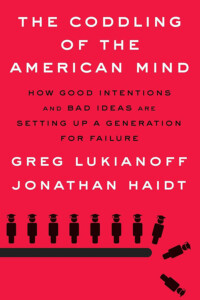
The Coddling of the American Mind: How Good Intentions and Bad Ideas Are Setting Up a Generation for Failure
On the one hand, you’ve got this online world, which is actually maybe more dangerous than the physical world. I think as we look to protect children from the online world, we actually need to give them more space in the real world and actually allow parents to make their own parenting decisions about what safety is, as opposed to the rules just getting harsher and harsher and clamping down on parents so that they have to be helicopter parents, because letting your child do anything with any degree of independence is putting you at risk of being labeled as a bad parent. There’s a book on that topic called The Anxious Generation: How the Great Rewiring of Childhood Is Causing an Epidemic of Mental Illness, not published by us, that’s by Jonathan Haidt.
I think that’s an interesting one, because if we want entrepreneurs, if we want economies that are growing with more diversification, and so on, we need more entrepreneurs and that starts with children. In fact, there’s one of our books by a former Navy SEAL in the US. He wrote a book, The Same Dead Children, about developing grit, and so on. Even Lamar Jackson, the MVP, he worked with us on two, not nonfiction books, children’s books, but it’s children’s books about instilling values of hope and opportunity and taking risks. His book is called I Dream, You Dream, Let Us Dream! by the NFL MVP the last two years, Lamar Jackson. Check that book out if you have kids and you want them to develop an entrepreneurial mindset.
Amazing. I felt so much passion there, Tim, that there might be a book inside you about this topic.
I think so.
Let us know because we have a one-year-old and we have a baby coming. We’re very passionate.
Thank you so much. Thanks for sharing all your stories. Thanks for your transparency and sharing, answering these questions. Maybe last thing, what’s the best way people can connect with you? Maybe you can say if somebody’s listening to this on.
TellWell Publishing is our website. If you’re in the early stages, we’re new in developing our plan your book on a one-page plan. Connect with me directly on LinkedIn. Tim Lindsay, TellWell. Connect with me there and you can be an early adopter.
Perfect.
Amazing. Thanks so much.
Thanks so much, Tim.
Thanks for having me. Excited for your next child.


